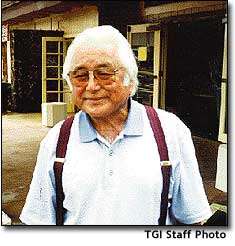In the war that Tsukasa “Tsuka” Murakami of Hanapepe fought in 60 years ago, there were no suicide bombers, no human shields, no terrorist attacks. Not knowing who your enemies are makes the current war in Iraq much more difficult
In the war that Tsukasa “Tsuka” Murakami of Hanapepe fought in 60 years ago, there were no suicide bombers, no human shields, no terrorist attacks.
Not knowing who your enemies are makes the current war in Iraq much more difficult for U.S. servicemen and women to fight than World War II, where the enemy was the Germans, period, he said.
“You don’t know who your enemies are” in the current war, said Murakami, a member of Cannon Company of the 442nd Regimental Combat Team of the U.S. Army.
The company fought in Italy and France before returning to Italy to finish the war.
“This (current) war is not just fighting the enemy. You’re concerned about the civilians, so that makes it that much harder for them,” said Murakami, on O’ahu today for the 60th anniversary reunion of the most-decorated regiment in WWII.
“People can say, ‘what the hell, this is war, bomb away and get it over with,’ but you can’t because of the civilians,” he said.
Technological differences between today’s fighting forces, with laser-guided missiles, smart bombs, bunker-busting bombs, and the one Murakami served in, with howitzers, rifles, pistols and bayonets, are obvious differences, he said.
But the fears of the soldier in combat, or knowing he or she is about to engage in combat, are timeless, he feels.
“One thing for sure, you’re not happy. You’re concerned,” he said. “You live day by day, not thinking about the future, only thinking about survival.”
The same kinds of feelings are being experienced by those in combat today, he said.
“After all, war is war. You gotta watch, and make sure you survive. Survival is important.”
He recalls days fighting in Europe, when Cannon Company followed infantrymen into battle after mortars had softened up enemy positions, telling soldiers new to the field of battle not to try to be heroes and get themselves killed.
Thousands died.
During one battle, the 442nd lost as many men while rescuing a group of Texas fighters who came to be known as the “lost battalion” as there were members of that rescued battalion.
“You know, we are considered honorary Texans” for that heroic feat, he said.
As in today’s war, some WWII battles lasted for days, with massive casualties on both sides.
Although as things are shaping up in Iraq the war could last much longer than many people predicted before the conflict flared, Murakami joins with many others in hoping for a quick end to the hostilities.
“I would like to see this thing get over as soon as possible. Going to war affects everybody, families, the economy,” he said.
“Because we went through war once before, any time Bush talks about war, I’m concerned,” said Murakami, who was on a cruise ship when Bush delivered his ultimatum that Saddam Hussein step down and leave Iraq or else war was imminent.
“I knew war was coming after the ultimatum was issued. My thoughts were, ‘it’s going to be different from the war we did, in World War II.”
The 80-year-old Murakami thought the current war was a young man’s war, until he saw a 62-year-old grandfather in uniform being interviewed in Iraq.
“Young and older guys are all fighting,” he said.
Getting back to the 442nd reunion, Murakami said 40 members and families of members of his Cannon Company are continuing reunion festivities on Kaua’i on Monday, April 7.
The 442nd has an annual reunion in Las Vegas, usually after Mother’s Day in May, but numbers of those veterans are quickly diminishing as death takes more of them every year.
It was Feb. 1, 1943, when President Franklin Delano Roosevelt wrote a letter authorizing the formation of a regiment made up entirely of Americans of Japanese ancestry, the 442nd.
The team arrived in Italy in June of 1944, moved to France at the end of September that year, and in October that year was ordered to rescue the lost battalion (36th Division), suffering nearly 2,000 casualties (140 dead, 1,800 wounded), bringing the 442nd down to half-regimental strength.
After the team helped to win the war, President Harry S. Truman pinned the Presidential Unit Citation on the colors of the 100th Infantry Battalion, Separate, and the 442nd, declaring, “You fought not only the enemy, but you fought prejudice, and you have won.”
At the O’ahu festivities beginning today, U.S. Sen. Daniel K. Inouye, D-Hawai’i, will for the first time be officially honored by fellow members of the 442nd Regimental Combat Team.
He was a sergeant and combat platoon leader when ordered to help rescue the lost battalion, and received a Bronze Star and battlefield commission to second lieutenant.
Later, in Italy, the 442nd was assaulting a heavily defended hill in the closing months of the war, when Inouye took a bullet to the abdomen that exited his body out his back, barely missing his spine.
He continued to lead the platoon, and advanced alone against a machine-gun nest that had his men pinned down. He tossed two hand grenades that hit their marks before having his right arm shattered by a German rifle grenade at close range.
Inouye tossed his last grenade with his left hand, and continued the attack with a machine gun before being knocked down the hill by a bullet to the leg.
He spent 20 months in Army hospitals after losing his right arm, and received the Purple Heart for being wounded in combat. His Distinguished Service Cross was upgraded to the Medal of Honor, which he accepted from President Bill Clinton in June 2000.
Staff Writer Paul C. Curtis can be reached at mailto:pcurtis@pulitzer.net or 245-3681 (ext. 224).


